In a tight competition for the person of the year 2023, Prishtina Insight chose the journalists who covered the tumultuous events unfolding in the northern region of the country.
As the curtain falls on the year, it’s a good time to reflect on the events that have defined the year we are leaving behind.
2023 was a dynamic year for Kosovars, but not always for the better. It’s the last year of Kosovars being cut off, as starting January 2024, they can jet off to EU countries without a visa. On the economic front, the country is slowly picking up the pace, trying to catch up with pre-Covid trends.
The unanimous verdict crystallized into an accolade not for an individual, but for a collective—the cadre of journalists who courageously reported from the North
Yet, the paramount news dominating the public discourse centered around the tensions brewing in the northern reaches of the country.
The year commenced against a backdrop of ethnic strife, as a KSF soldier assaulted two Serbs in Shtërpcë. Subsequent chapters unfolded with a May marked by upheaval in the North of Kosovo, where numerous journalists and 30 NATO/KFOR soldiers found themselves under attack. September witnessed another crescendo, pitting Kosovo police against a terrorist faction in the North, led by the former Serbian List vice-president, Milan Radoicic, following the tragic demise of a Kosovo policeman.
Amidst the array of challenges, numerous unsung heroes emerged, sacrificing personal safety for the collective good. The decision-making process proved to be no trifling matter for the team at Prishtina Insight.
But in the end ,the unanimous verdict crystallized into an accolade not for an individual, but for a collective—the cadre of journalists who courageously reported from the North.
According to Prishtina Insight, they rightfully claim the mantle of Person of the Year.
Without media, there is no democratic society, and along with it, there is no state
Throughout the year, a staggering 72 cases of attacks and harassment against journalists and media entities were documented, as per data from the Kosovo Association of Journalists, with 29 incidents transpiring in the north. Among these, 20 direct attacks targeted journalists in the line of duty.
“The year 2023 was a year of high physical peril for journalists on the ground, with attempts to shut down Klan Kosova, with a conspicuous lack of transparency, with an attempt to capture RTK [the public broadcaster] by the Vetëvendosje Movement and increasing Anti-Media rhetoric,” Flutura Kusari, media lawyer, told Prishtina Insight.
Even after the attack, we did not stop, we continued reporting from the zone
“The main challenge of journalists, cameramen and operators has been the lack of physical security, especially when reporting the tensions in the north of the country. The Ministry of Internal Affairs and the Police have failed to take measures to secure journalists. There is no National Strategy or Action Plan for the security of journalists, there is no special telephone reporting line for attacks on journalists, when the situation escalates, the security perimeter is not set and there is no dialogue between government actors,” Kusari added.
According to her, 2023 in particular has been characterised by shrinking media space for women journalists and activists who constantly experience online violence.
“The state left journalists unprotected. They should not wait for a journalist to be killed in order to create protection mechanisms. We urgently need a protocol for the protection of journalists,” said Kusari.
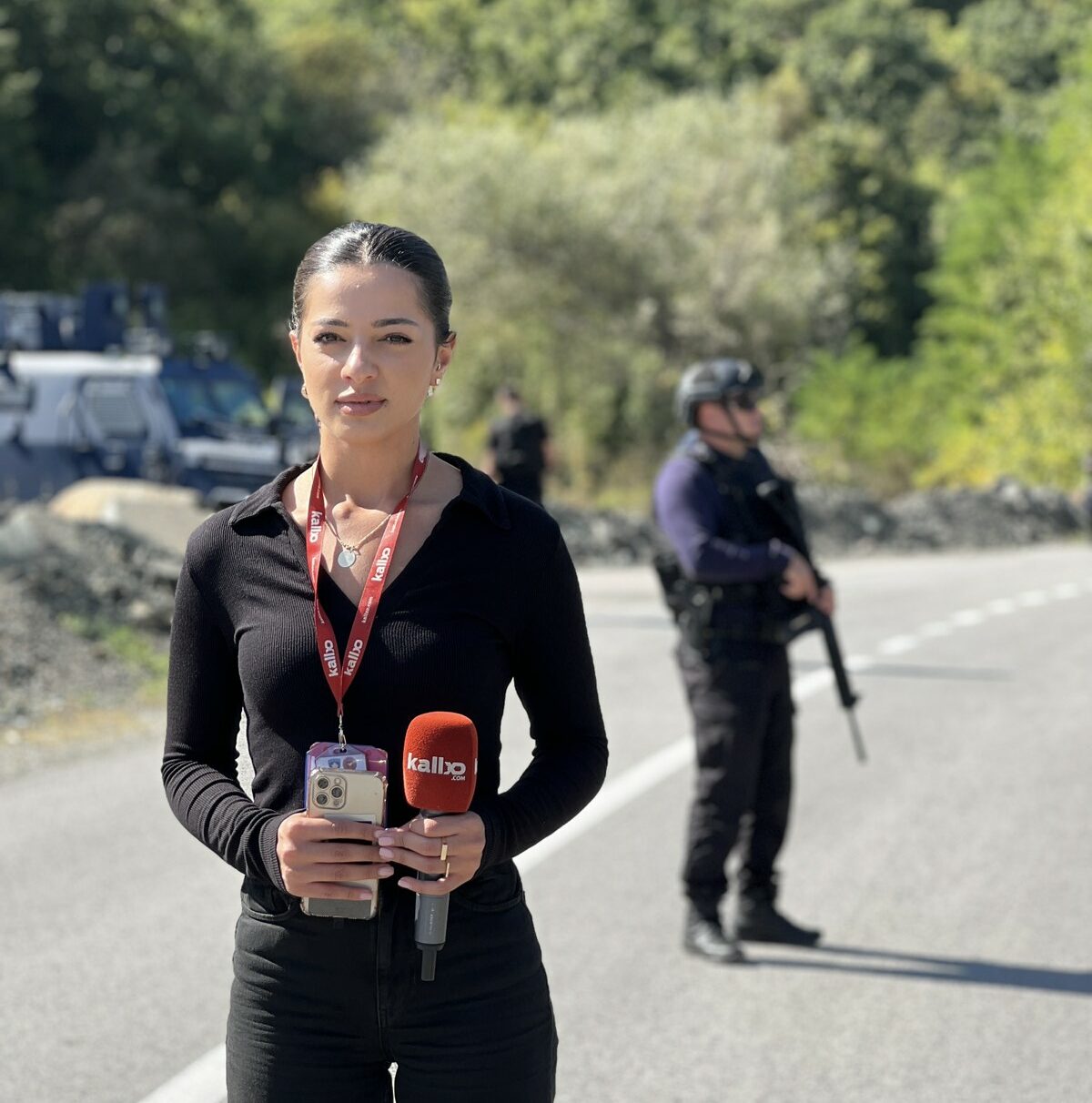
Photo courtesy of Adelina Ahmeti.
Adelina Ahmeti, the journalist from Kallxo.com who reported from the north said that for them as journalists the main mission was to report the accurate information from the ground.
“We have been attacked, we have been offended and insulted all the time, but this has not stopped us from being there even after seeing what is happening and what is happening in the areas mainly affected by the protests,” Ahmeti said for Prishtina Insight.
“I appreciate the fact that journalists who reported from the north are being selected as person of the year, because everyone who has gone there faced something, and this has affected them both emotionally and psychologically,” she concluded.
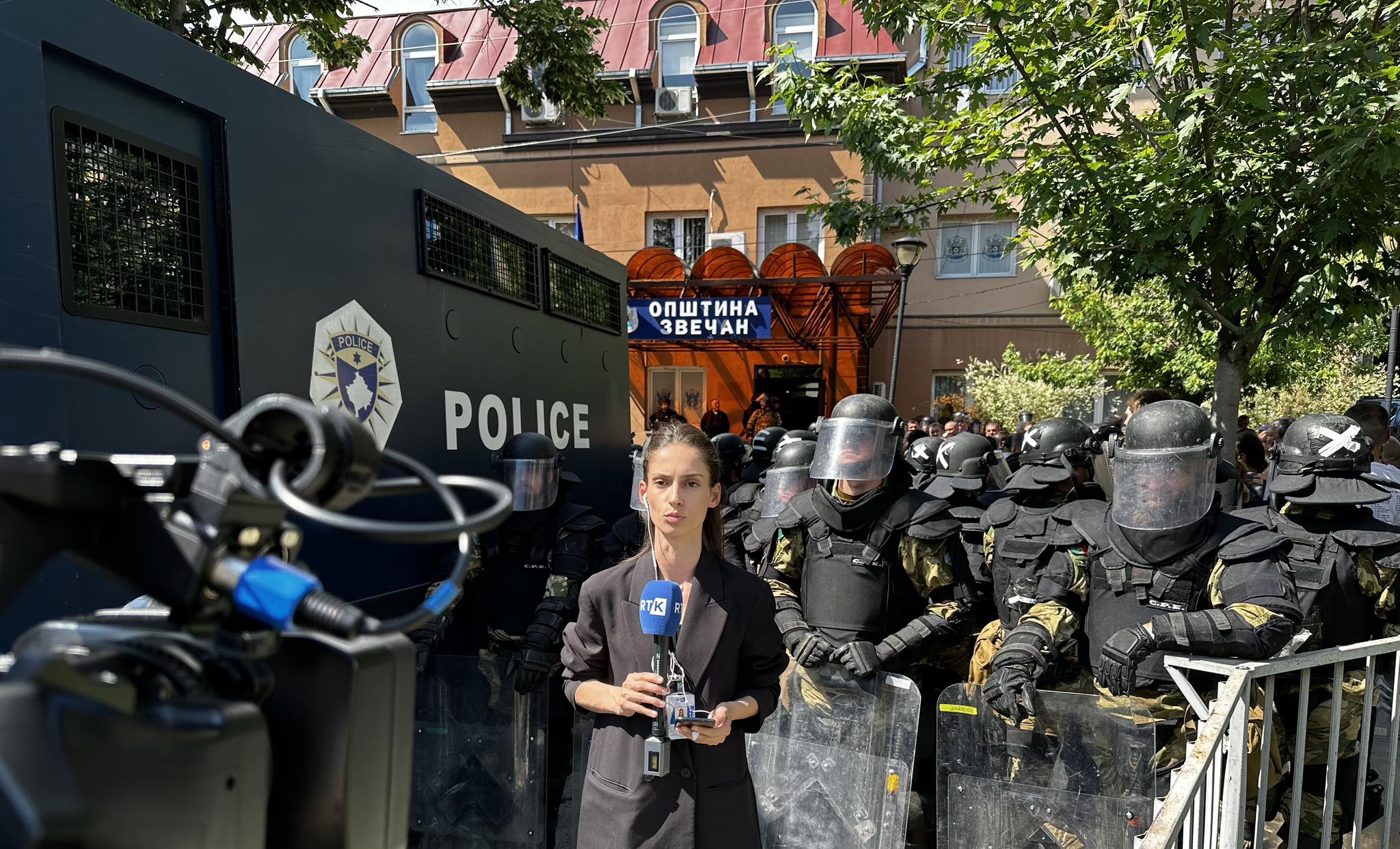
Photo courtesy of Edina Avdiu.
Edina Avdiu, journalist from RTK confesses for Prishtina Insight that reporting from the north was never easy.
“While reporting from the north, I was always accompanied by a feeling of insecurity because I was aware that I was very close to danger, very close to criminal and terrorist groups and that very easily, I and my team could have been the target of an attack,” narrates Avdiu for Prishtina Insight.
“In addition to the danger, reporting from such areas and situations also has many difficulties. It has often been impossible to provide food, due to the unsuitable terrain. The communication with the family has also been difficult, sometimes even impossible, because the phone numbers have been out of order in that part of the country,” she added.
She recalls the time when around 40 journalists were stuck in a bar in Zvecan, while reporting about the turmoil there, on May 29 and in the absence of help from the Kosovo Police and KFOR, journalists were forced to make their own solution and get out of there, even though they were in serious peril.
“Therefore, I think that in terms of the safety of journalists, the state can and should do more, in order to facilitate our work in the service of the public,” she added.
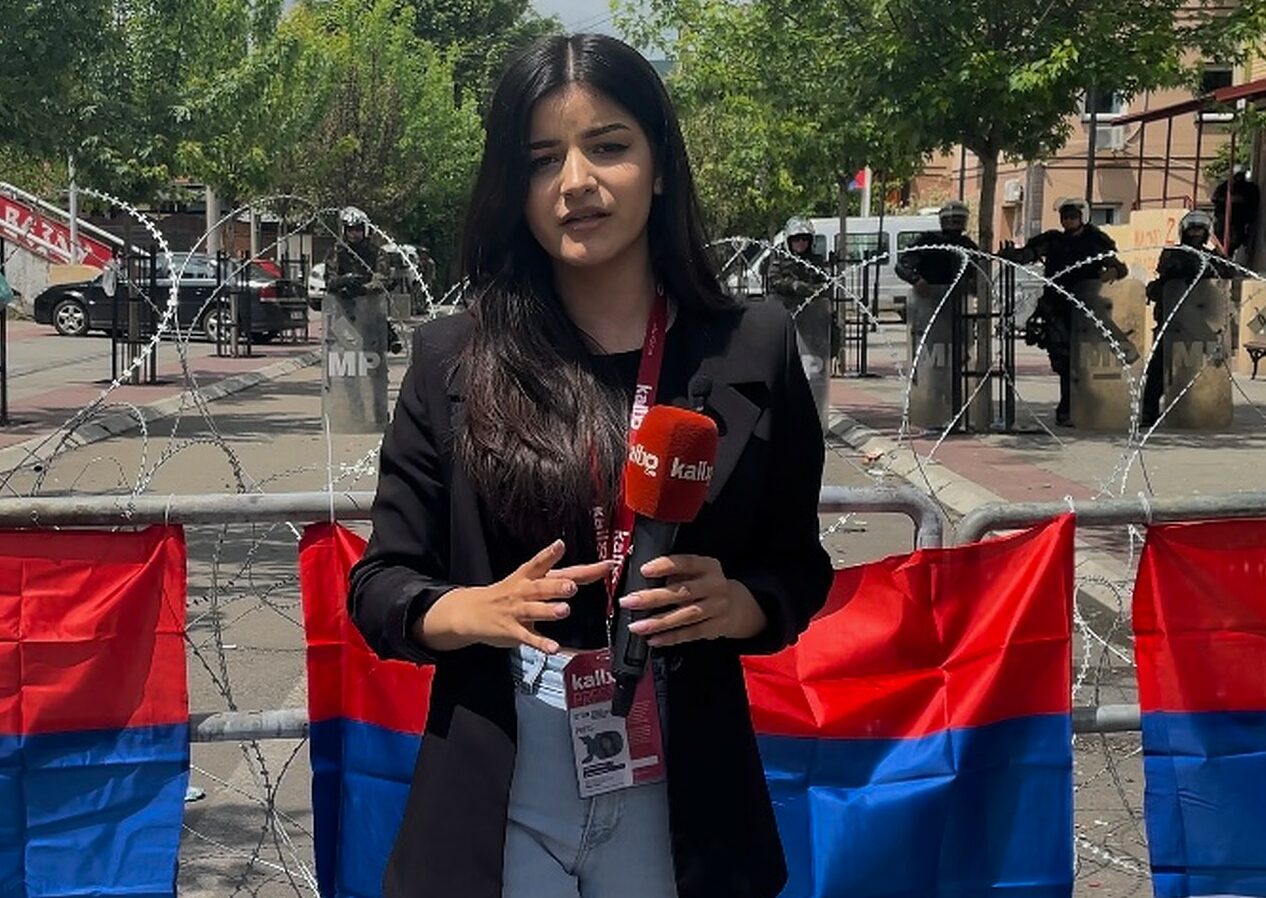
BIRN’s journalist, Shkodrane Dakaj, while reporting live from Zvecan. Photo: BIRN/Afrim Ejupi
Half of the work that Shkodrane Dakaj from Kallxo.com did in the past year was from the north of the country. She recalls moments on May 29, when she and her team were attacked with glass bottles, stones and other objects, while covering the turmoil in Zvecan.
“Even after the attack, we did not stop, we continued reporting from the zone, trying to cover each event. Sometimes we would stay up to 12 hours or longer in the area, trying to get as much information as possible, so that our reporting would be correct,” Dakaj told Prishtina Insight.
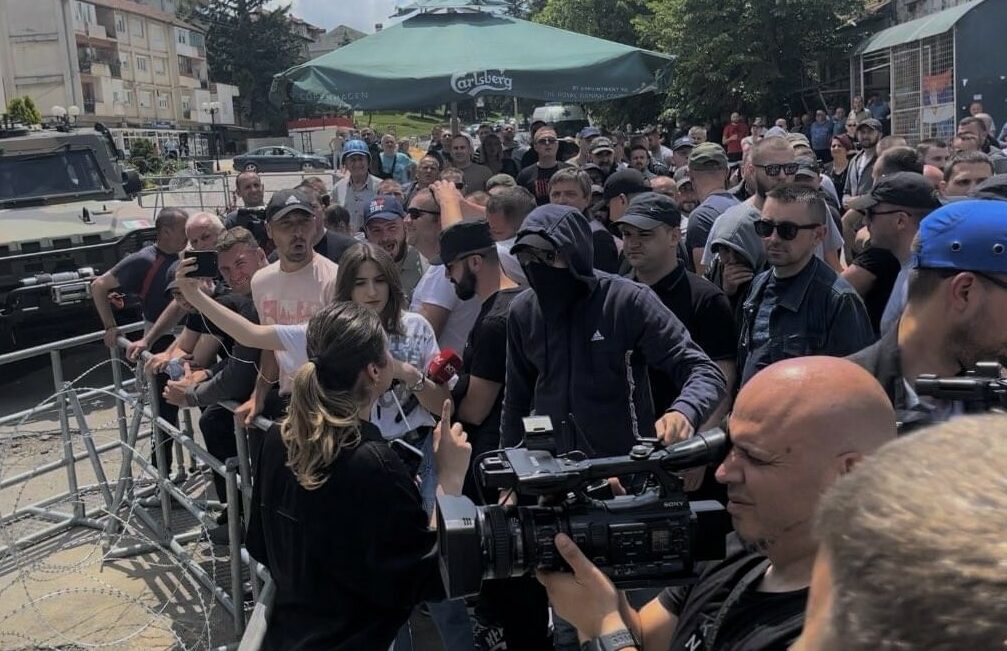
Photo courtesy of Fetije Kamberi.
Fetije Kamberi, from Tëvë, vividly remembers the period of May when she reported on the local Serbs’ protests following the assumption of office by the new Albanian mayors.
The initial two days of the protest were relatively calm, but challenges arose when the Kosovo Police withdrew, ceding control to KFOR, according to her.
Reporting became increasingly arduous, and a sense of heightened threat enveloped us, she reflects. She further noted that KFOR remained unresponsive during attacks journalists faced.
Liridon Llozani, a journalist from RTV Dukagjini, told Prishtina Insight that the reporting period during May and September was arguably the most impactful phase for his professional development.
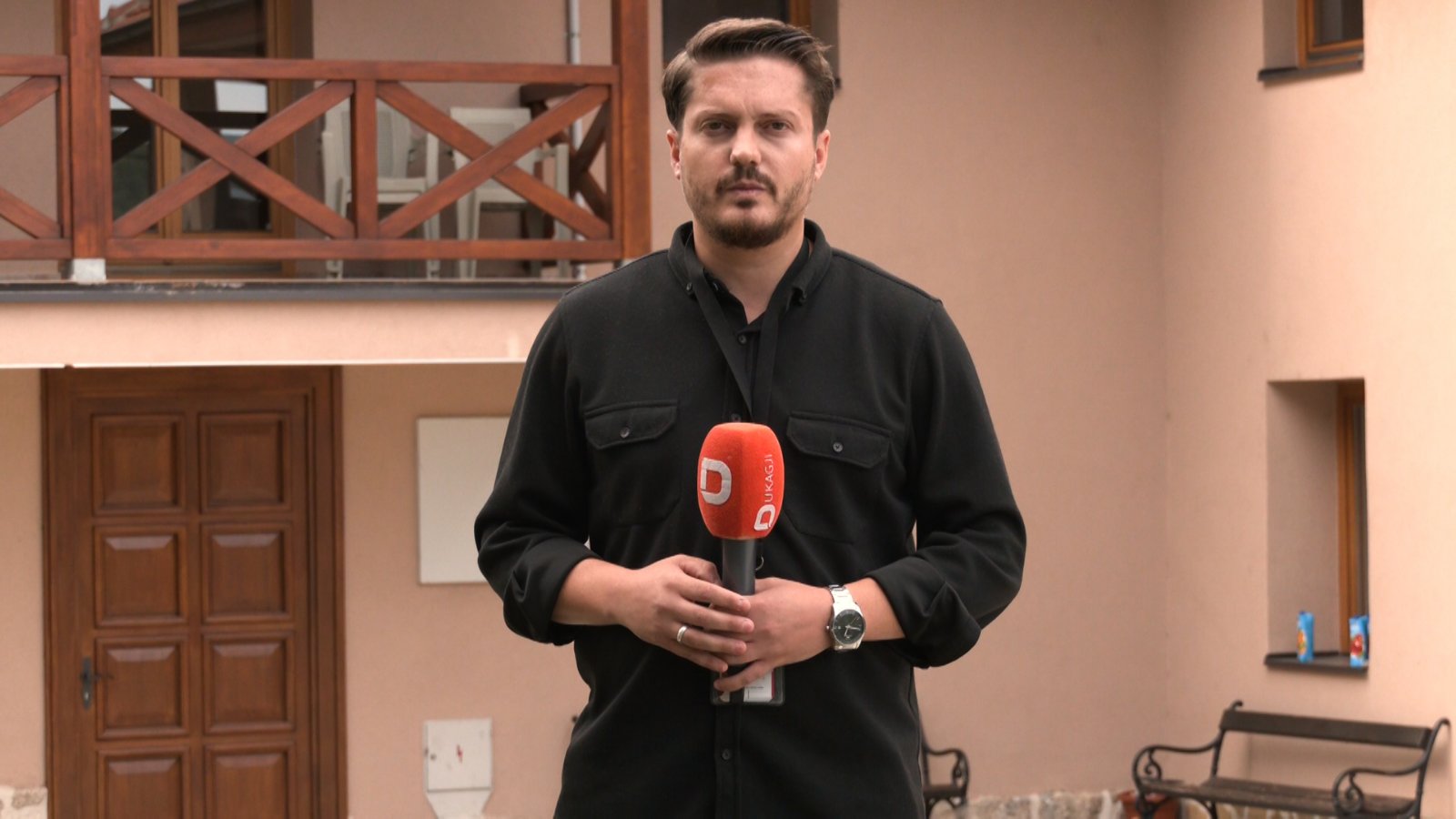
Photo courtesy of Liridon Llozani.
“Spending hours in one place with masked individuals, who targeted media to attack, walking at night in dark and unsafe locations, equipped only with work tools but without any protective tools [helmet or bulletproof vest] were challenging,” he recalled.
“When you’re in the field reporting, you may not fully grasp the significance of your work and information until you engage in conversations with people and see that their perception and thinking have been greatly influenced by the information you have provided. It is both a pleasure and a privilege to be among journalists who are appreciated with epithets given. It comes at a time when the work of journalists is undervalued and marginalized for various reasons, and is only appreciated by a minority,” he added.
Llozani concludes on a powerful note: For the majority of democratic changes in Kosovo, the media deserves credit, at least to begin with, both in the political and social aspects. Without media, there is no democratic society, and along with it, there is no state, he said.
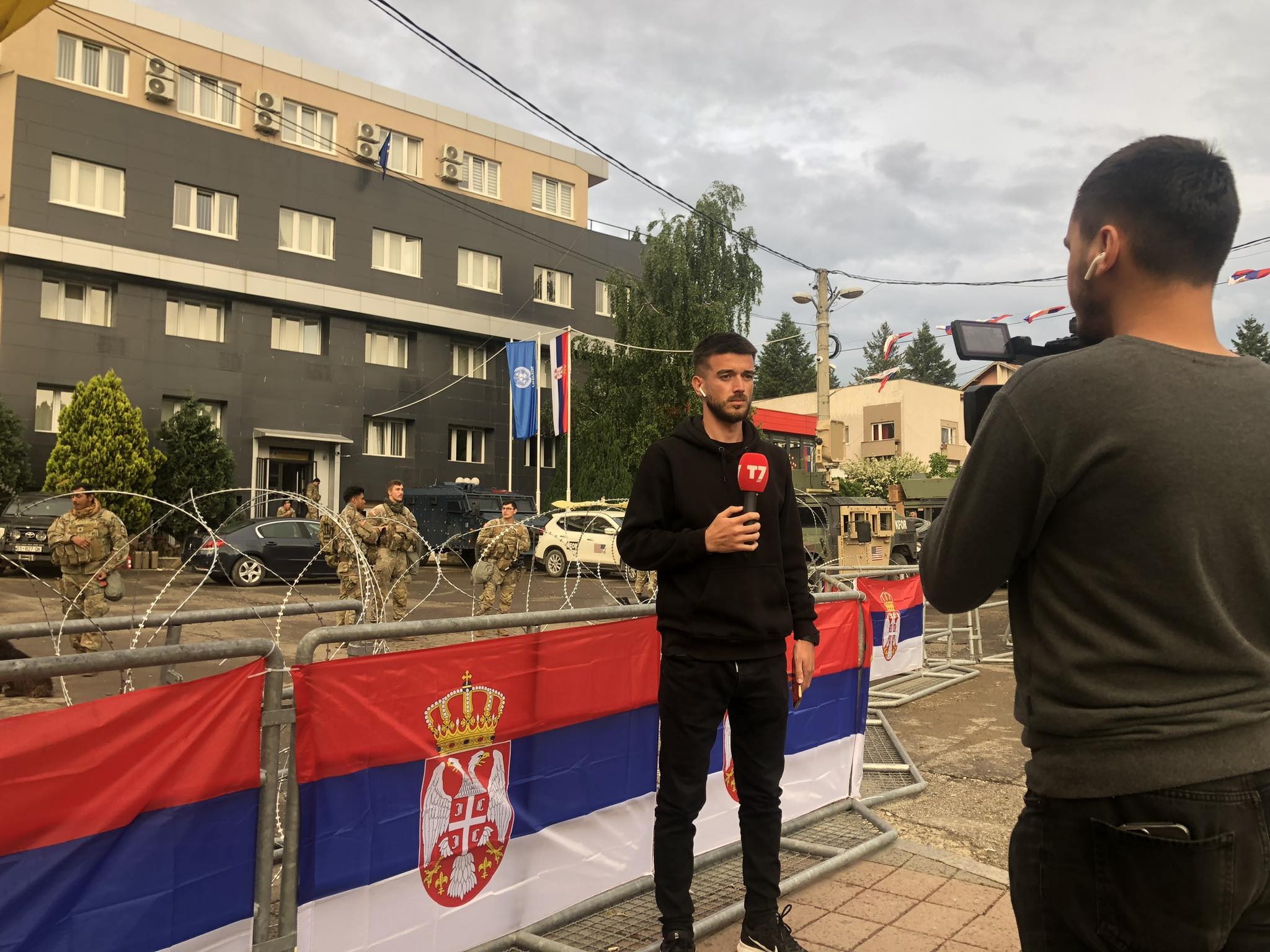
Photo courtesy of Clirimtar Morina.
Çlirimtar Morina from T7 television, also feels that reporting from the north is always different from reporting from other parts of Kosovo.
“It has been difficult and tiring, but at the same time also proud, since all the local and international public opinion has used our reports as basis for their reflections for what was happening in the four municipalities with a Serbian majority in the north of the country,” said Morina.
He criticised the Kosovo Police for not giving the necessary support for journalists during the recent events in the north and said that they were even closed in providing information.
“I hope that next year, the north of Kosovo will be fully integrated and in full compliance with the laws and regulations of the Republic of Kosovo, that journalists will report the same as in any other part of the country, and that there will be as little unrest as possible. as normal as possible for all citizens from all communities living in that part of the country,” he added.
Drin Demiri, the journalist of Klan Kosova that reported from the north, thinks differently about the person of the year selection.
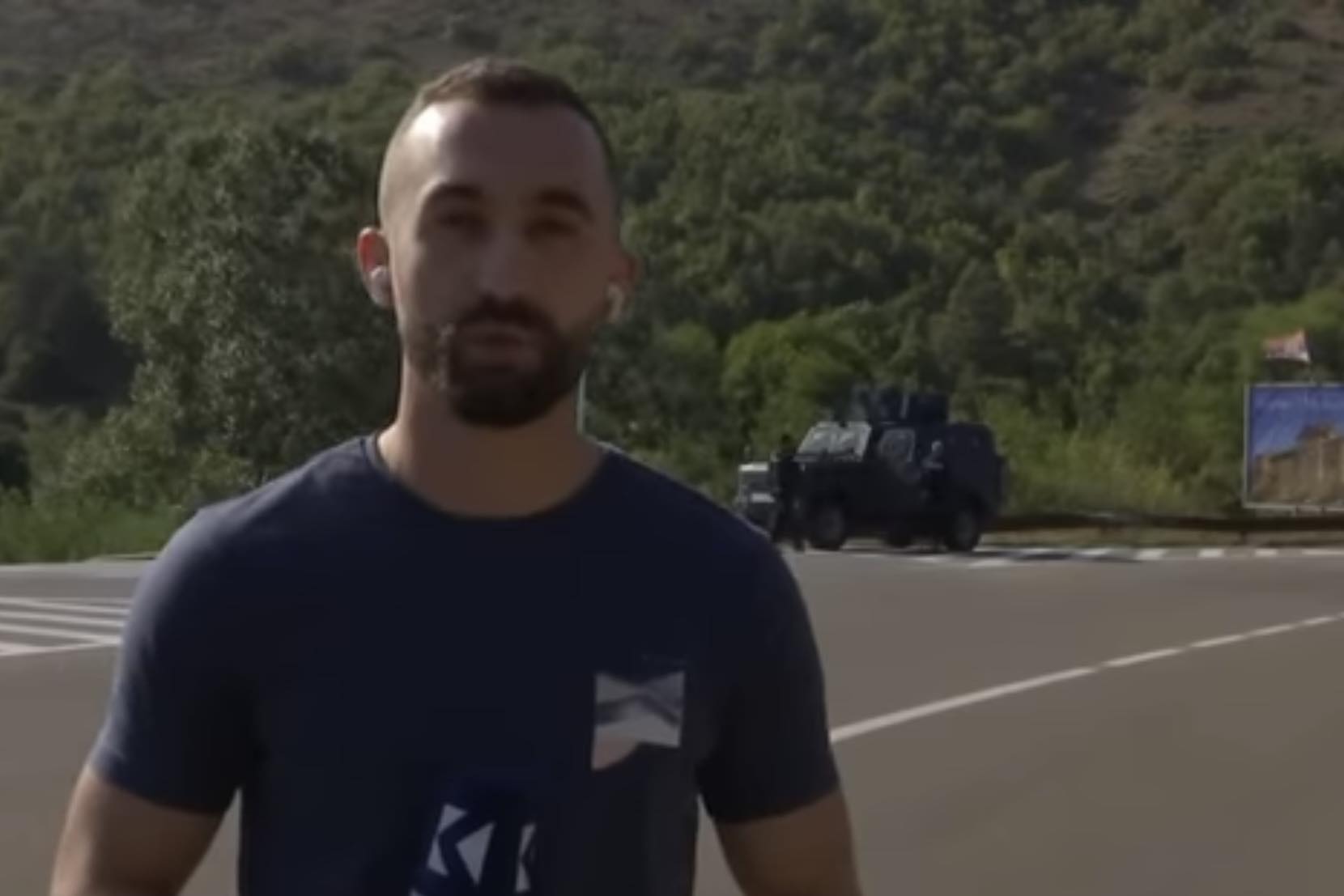
Photo courtesy of Drin Demiri.
“I believe this is one of the rare instances [if not the only one] that the person of the year you select is not happy to receive this epithet,” he said.
“This is because what distinguishes journalists as Persons of the Year, beyond their contribution to societal information, is the perils and threats intrinsic to the work they undertook,” elucidated Demiri to Prishtina Insight.
However, he says that he is convinced that every journalist was proud of the fact that this epithet also comes because of informing the public at a very difficult time for the state, especially for its northern part.
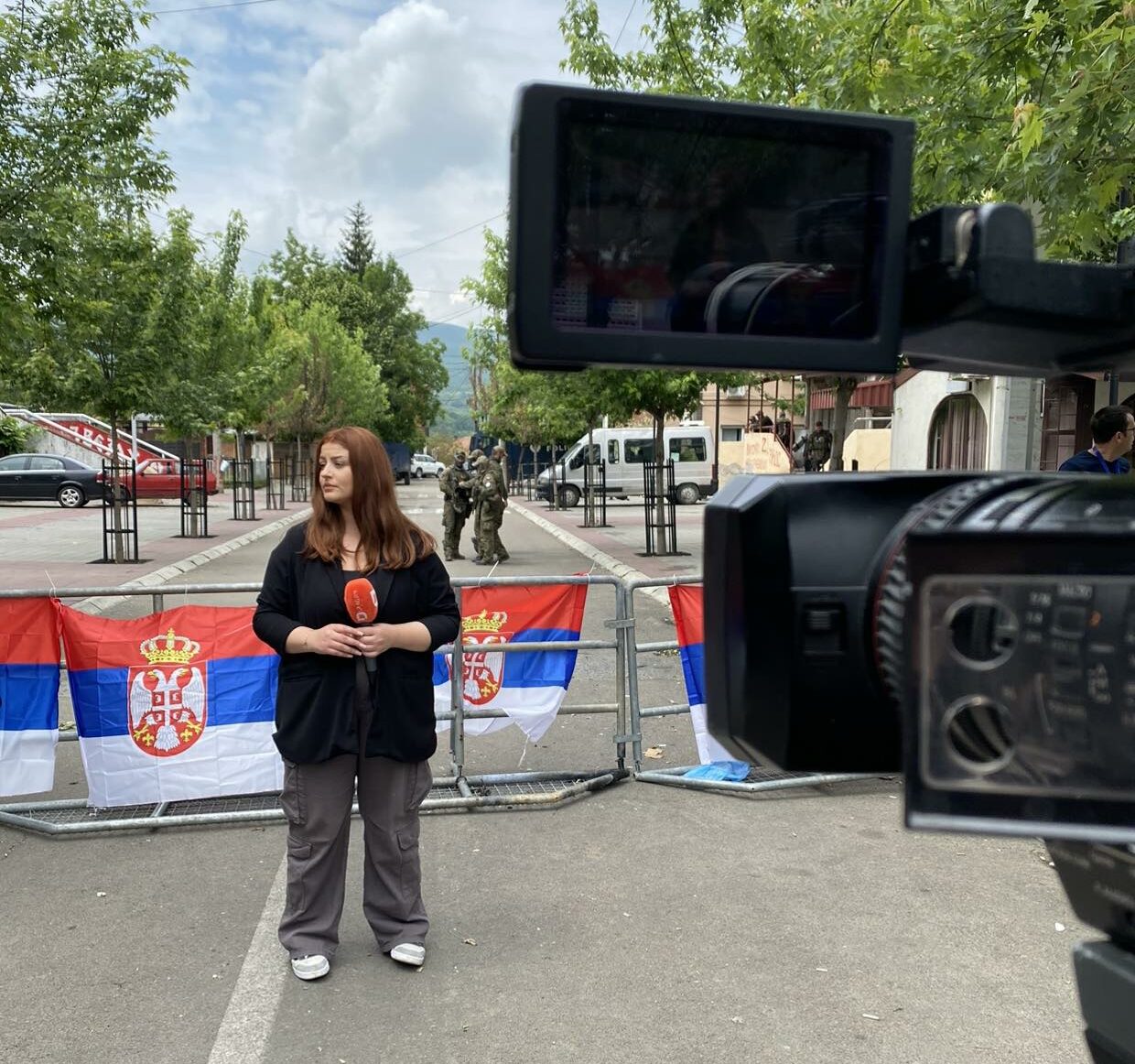
Photo courtesy of Doruntina Bylykbashi.
Doruntina Bylykbashi from RTV Dukagjini said that reporting from the north was a new experience for her that grew her professionally. She recalls that while reporting, they were often attacked verbally or physically by the protesters because they were seen as the ‘enemy’ and they felt fear, but the Kosovo Police minimised this feeling, as they tried to help in their capacities.
“The evaluation from Prishtina Insight makes me feel honoured, and I consider that this year was the year of journalists, because through our reporting the event became international,” said Bylykbashi.
She hopes that 2024 will bring political solutions that do not involve conflicts.
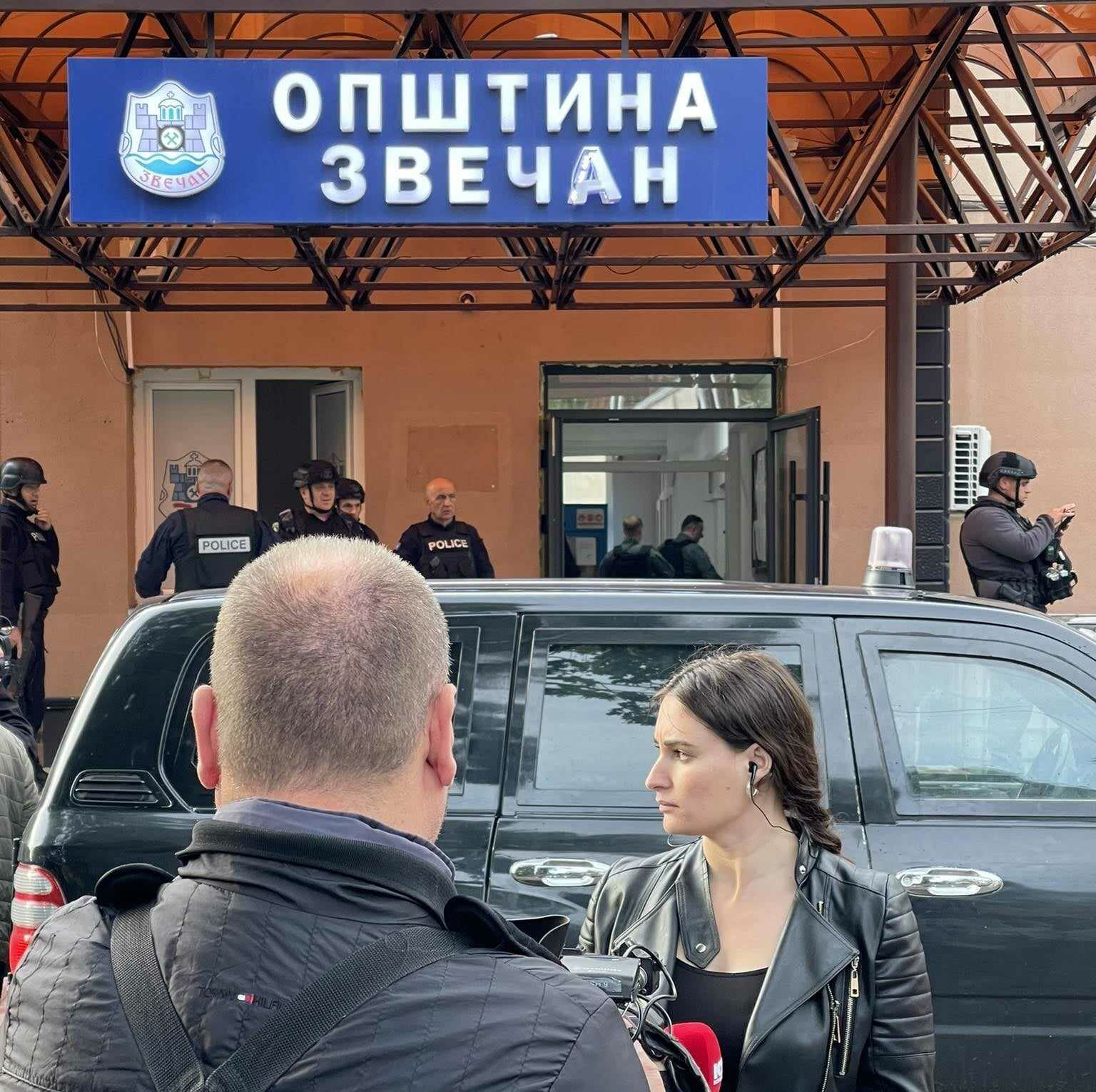
Photo courtesy of Valbona Bytyqi.
Valbona Bytyqi has reported from the north for many years now, during her work as journalist for KTV. She confesses for Prishtina Insight that reporting from there is never easy. It was particularly difficult during May and September.
“Along with the lack of security, work becomes difficult also because of the conditions we work in, lack of information, risk of fake news and the problem with confirming information,” she says.
The evaluation from Prishtina Insight is a feeling we don’t get often, she confesses.
A message for next year
As we reflect on the year drawing to a close, the collective sentiment among journalists echoes a sense of pride in the acknowledgment received.
a call for the Kosovo Police, Prosecutor's Office, and the Courts to accord priority and utmost seriousness to all attacks on journalists
However, the journalistic community expresses a fervent hope—that 2023 marks the final chapter in reporting the turmoil in Kosovo. The collective yearning is for the upcoming year to usher in a period of stability and peace.
In May, a BIRN analysis of 62 incidents involving firearms, knives, stones and physical assault against journalists since 2017 concluded that police and prosecutors in Kosovo still struggle to solve violent crimes, particularly when they occur in the mainly Serb north, where half of the cases occurred in the four northern Serb-majority municipalities.
A recurring theme in this plea for change is a call for the Kosovo Police, Prosecutor’s Office, and the Courts to accord priority and utmost seriousness to all attacks on journalists.
“In 2024, the least the Government can do is implement the Council of Europe’s 2016 Recommendation on the Safety of Journalists and begin preparations to implement standards to combat Strategic Lawsuits Against Public Participation [SLAPP],” Kusari, the media lawyer, concluded.





